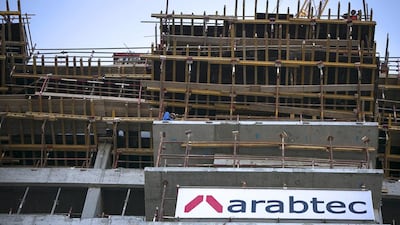The embattled UAE contractor Arabtec has announced that its acting chief executive, Mohamed Al Fahim, has stepped down from his position citing “other commitments”.
Mr Al Fahim, who took on the role following the departure of Arabtec’s former chief executive Hasan Ismaik in June 2014, will remain on the board, however, and will be replaced as acting CEO by fellow board member Saeed Al Mehairbi.
Mr Al Mehairbi also holds management positions at Abu Dhabi National Oil Company and at International Petroleum Investment Company (Ipic) – the Abu Dhabi Government-owned investment company that owns more than 92 per cent of Arabtec's biggest stakeholder, Aabar Investments.
Arabtec has undergone a couple of major restructuring exercises since the departure of Mr Ismaik, including a shake-up of its management team.
It has also been forced to recognise losses on a number of contracts, which led to the firm declaring a third-quarter net loss of Dh944.7 million this month as revenue dropped 24 per cent to Dh1.6 billion.
This brought its accumulated losses for the nine months to September 30 to Dh1.94bn, compared to a profit of Dh309m in the same period last year.
Nishit Lakhotia, the head of research at Bahrain’s Securities and Investment Company, said the current environment was difficult for all contractors, as they are all having to contend with project delays and payment issues. “With Arabtec, things obviously got aggravated because it’s undergone a phase of transition again after it went through one under the previous CEO, Ismaik.
“The new management has changed the strategy.
“Because of the transition, their costs shot up,” said Mr Lakhotia.
“This was like a double whammy. So costs had to be brought down, but that doesn’t happen overnight. It still seems that they don’t have a clear-cut, stable management, with the new [acting] CEO also being temporary. So the transition phase is not yet over in my opinion.”
The company’s shares fell 4.3 per cent to Dh1.11 yesterday, which is 83 per cent lower than the Dh6.84 per share peak it was trading at in mid-May 2014.
mfahy@thenational.ae
Follow The National's Business section on Twitter


